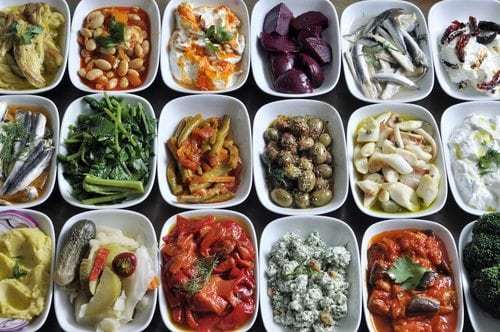Built on a foundation of fruits, vegetables, whole grains, and fish, the Mediterranean diet has slowly gained popularity as an effective way to increase longevity and stave off chronic illness and cognitive decline. Characterized by the traditional cooking style of countries bordering the Mediterranean Sea, this diet incorporates the basics of healthy eating and permits a glass of red wine with dinner. What’s not to love? After exploring all the benefits of the Mediterranean diet, we are sure you’ll want to try it.
What Is the Mediterranean Diet?
The Mediterranean diet combines common food types and healthy habits from the traditions of certain countries in the Mediterranean region, including Greece, Spain, southern France, Portugal, and Italy (source). People eating a Mediterranean diet consume plenty of fruits, vegetables, high-fiber grains, and fish. Thus, following this diet provides you with plenty of nutrients and a variety of food options. While more research is needed to confirm the precise benefits of the Mediterranean diet, it is known to be low in trans fats and free from refined oils and highly processed foods.
Benefits of the Mediterranean Diet
Embracing a Mediterranean diet may help lower your risk for certain diseases, improve your mood, and boost your energy levels. It can help keep your heart healthy by preventing heart disease, lowering your risk of a heart attack, reducing your cholesterol, and preventing type 2 diabetes and metabolic syndrome (source). When it comes to your brain, this diet might help prevent stroke, Alzheimer’s disease, depression, and Parkinson’s disease. Finally, its focus on plant foods and natural sources means that the Mediterranean diet contains plenty of beneficial nutrients, including the following:
Healthy Fats
Dietary guidelines for the United States recommend that saturated fat should make up no more than 10 percent of calorie intake. Which is good, because this diet is low in saturated fat and high in monounsaturated fat. Win, win. Common sources of healthy fat in the Mediterranean diet include olives, nuts, and fish.
Fiber
The diet is also high in fiber, which promotes healthy digestion and is believed to reduce the risk of bowel cancer and cardiovascular disease (source).
High Vitamin and Mineral Content
Fruits and vegetables provide vital vitamins and minerals, which regulate bodily processes. In addition, lean meats provide vitamins like B12, which are not found in plant foods.
Low Sugar
The Mediterranean diet includes natural sugar (found in foods like fruit, honey, milk) rather than added sugar. Added sugar is linked to diabetes and high blood pressure, and occurs in many of the processed foods absent from the Mediterranean diet.
Getting Started
Start reaping the benefits of the Mediterranean diet today by following these simple guidelines:
- Focus on fruits and vegetables, making them staples of your diet.
- Eat beans, legumes, nuts, and whole grains daily.
- Season foods with herbs and spices instead of salt, fat, and sugar.
- Cook food with olive oil or avocado oil instead of butter.
- Focus on lean proteins, primarily fish, and eat less than three ounces of chicken or red meat per week.
- Limit your intake of sweet and high-sugar foods. Base your dessert intake around fruit.
- Drink red wine in moderation (optional).
Finally, a key part of Mediterranean dining culture is eating with others, and sharing healthful, nutritious meals. This is a great way to approach the diet, with enthusiasm and the support of family members or close friends. They can help reinforce the positive changes and keep you on track. Bon appétit!
_____
Are you looking for an assisted living community in Tennessee? If so, be sure to check out Hearthside Senior Living Place, located in Bartlett, Tennessee. We would be happy to schedule a tour for you so that you can explore the community, meet some of the residents, and ask any questions you might have. For more information, please call 901-854-6590. We look forward to meeting you!

